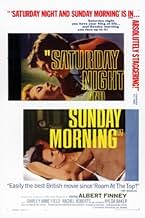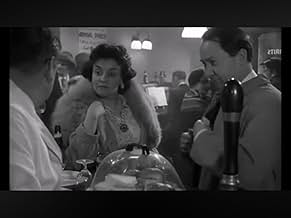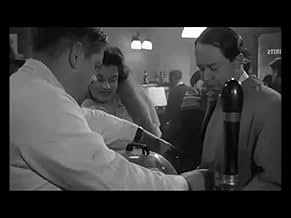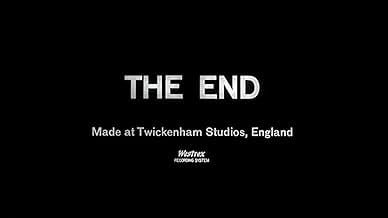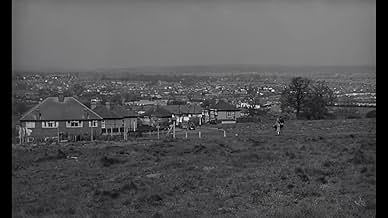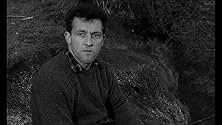Adicionar um enredo no seu idiomaA rebellious, hard-living factory worker juggles relationships with two women, one of whom is married to another man but pregnant with his child.A rebellious, hard-living factory worker juggles relationships with two women, one of whom is married to another man but pregnant with his child.A rebellious, hard-living factory worker juggles relationships with two women, one of whom is married to another man but pregnant with his child.
- Ganhou 3 prêmios BAFTA
- 10 vitórias e 3 indicações no total
- Mrs. Seaton
- (as Elsie Wagstaffe)
- Loudmouth
- (as Colin Blakeley)
Avaliações em destaque
"Neither of 'em's up to much, but it ain't our fault," he tells her. Like everything else in his unhappy life, it's all a matter of inheritance.
Arthur may share a name with a heroic English king, but he's not one to wear his lower-middle-class crown agreeably. He drinks away his wages, lashes out at defenseless women, and lies with discomfiting ease. But Albert Finney and the filmmakers make sure you care about him anyway.
As Seaton, Finney glowers a lot in the way you expect from a protagonist in a kitchen-sink drama, a celebrated product of British New Wave cinema. But the film plays with your expectations just as life does his. He doesn't want to settle for life as he finds it, and while "Saturday Night And Sunday Morning," Alan Sillitoe's adaptation of his own novel directed by Karel Reisz, spits a lot in the direction of conformity, it belies its angry-young-man pedigree with a sense of cosmic acceptance at taking what life has to offer.
Seaton's a "madhead," make no mistake. But he's not an especially honest one. He lies impulsively, often to no purpose, and is even proud of it. "I always was a liar, a good one and all," he tells the married woman he sleeps with, Brenda (Rachel Roberts). Ironically, it's his one honest moment on her behalf that lands him in real trouble.
The film gives us other hints Seaton is not an admirable figure, like shooting an annoying neighbor with an air rifle in a manner that comes off more creepy than defiant. A "working-class anti-hero," as other reviewers put it, and the real craft in both the direction and in Finney's performance is how it accomplishes the balancing act of establishing Seaton as both miserable company and a rooting interest.
It's a well-structured film, too, a quick 90 minutes that breaks neatly into thirty minutes of establishing the situation, thirty minutes of developing a crisis (Seaton stringing along two women, one pregnant), and thirty minutes of tense resolution. At the same time, Reisz gives his film a grimy authenticity that feels real, never stagy, with scenes that have a real lived-in quality while serving the larger story.
"Saturday Night And Sunday Morning" is a bleak film in many ways, not pleasant to watch. Laughs and insights are minimal, and Finney downplays his considerable screen charm. There are hardly any toothy grins like he'd bestow on his later breakout role, as the title character in "Tom Jones." The handling of his relationship with Doreen is a trifle pat, and too-simply resolved. So is the issue of his relationship with Brenda, although Finney shares a good final scene with her character's husband, played effectively by Stephen Fry lookalike Bryan Pringle.
There are a lot of good performances in this film, which blend together to create an effective if routine story. If it's not what you expect from angry-young-man cinema, it's nice to have your expectations batted down now and then.
Equally I knew that, on leaving, I would see his aunt (Hilda Baker) in the local chippy, and that Norman Rossington would be cycling to some nearby canal to fish. Indeed when Ben (my friend) and I left we went to our local for a quick pint and, I swear,we both had the uncanny feeling of being part of the film.
Time has passed and the working class East and West Midlands have change completely so it may not have such resonance for a new generation but if you want to know what a good slice of England looked and sounded like in the 1950s you should see it: it's better than any documentary. Indeed it is a great film.
Today some will be puzzled by the dilemmas and themes to the point of "so what?"
Writer Alan Silitoe (from his own novel) quickly draws us in the to real world of a Nottingham factory worker. This is not the factory work of normal movies with the made-up hero having a blob of black stage paint across his forehead; more the dishevelled, sweaty, badly lit world that he knows from first hand experience.
In it we find Finney, smoking and gruff at his lathe. No actor, before him or after has ever made so much of an impression in a mundane situation as the ex-Shakespearen actor does here. Reality comes out of every pore. His matter-of-fact speaking voice, as a voice-over narrator, should not be underrated either - like someone giving testimony partly against their will.
His world of is one of petite rebellion and cheap thrills. The "fighting pit prop that wants a pint of beer." He is immoral and the wife of a friend is seen as fair game: Although the consequences are beyond his immature mind.
There is good supporting performances from British character actors such as Norman Rossington and Hylda Baker, but this movie belongs to one man and one man alone: Sir Albert Finney.
Twenty five years after he is dead the cinematic world is going to wake up and realize how brilliant an actor this man was: Like they did with Humphrey Bogart
The thing that deserves the most praise, however, is Sillitoe's script, which puts virtually all modern dramatic screenplays to shame. In a general way, the working class british films of the late 50s and 60s launched the tradition that leads to Loach, Leigh, Tim Roth, etc. This film's subtlety and ambivalence towards its leading character reminds me specifically of Mike Leigh at his very best.
Você sabia?
- CuriosidadesThe factory scenes were filmed in the same factory that original author Alan Sillitoe worked in during the war when he was making shells and other artillery. At the time of filming, the factory was owned by the Raleigh bicycle company.
- Erros de gravaçãoWhen Arthur and Doreen meet for the first time, her packets of crisps on the counter disappear and reappear between shots.
- Citações
Arthur Seaton: Mam called me barmy when I told her I fell of a gasometer for a bet. But I'm not barmy, I'm a fighting pit prop that wants a pint of beer, that's me. But if any knowing bastard says that's me I'll tell them I'm a dynamite dealer waiting to blow the factory to kingdom come. I'm me and nobody else. Whatever people say I am, that's what I'm not because they don't know a bloody thing about me! God knows what I am.
- ConexõesFeatured in Viewpoint: We the Violent: Part 1 (1961)
Principais escolhas
- How long is Saturday Night and Sunday Morning?Fornecido pela Alexa
Detalhes
- Data de lançamento
- País de origem
- Idioma
- Também conhecido como
- Todo comienza el sabado
- Locações de filme
- Empresa de produção
- Consulte mais créditos da empresa na IMDbPro
Bilheteria
- Orçamento
- £ 100.000 (estimativa)
- Faturamento bruto mundial
- US$ 370
- Tempo de duração1 hora 29 minutos
- Cor
- Proporção
- 1.66 : 1
Contribua para esta página



